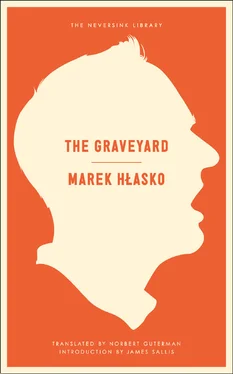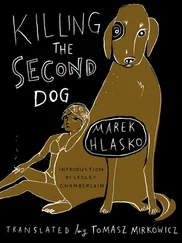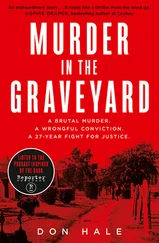Two policemen passed in the middle of the roadway. Their steel badges gleamed dully. Imprisoned in the circle of a flashlight, Franciszek crossed the street. Once again he walked along a moldy wall covered with posters that flapped in the stinking wind, threatening, admonishing, persuading; carrying the entire contents of the world, they hung there precariously in the empty blustery night. Somewhere at the end of the night a song rang out. Franciszek turned his head; the solid shadows of the two policemen had merged with a third, fluid shadow; the song evaporated, changed into a stammer; and the night sucked it in, along with the water flowing in the gutters.
“Watch out!” someone cried behind him. “Where are your eyes?”
He stopped. A large hole, left uncovered by sewer diggers, gaped at his feet. At the bottom of the ditch the damaged pipes gurgled happily and emitted a strong stench.
“Thanks,” said Franciszek. “Good night.”
“Good night.”
He touched the brim of his hat; it was sodden and slippery.
… In the end I did fall, after I don’t know how many agonizingly painful steps through the darkness. I crawled, in the mud and water, toward the woods, where the darkness was thickest. Now I felt no pain; I thought only of the mud; I was all clogged up with mud — I felt it in my mouth, my eyelids, my nose and ears; I was tormented by the absurd thought that the mud would get into my lungs — perhaps through my wound. Behind me came dogs, shots, and hurried splashing steps. I turned over on my side; I saw dark figures running toward me across the bare slippery fields. How many were there? How many yards separated them from me? I didn’t know; I knew only one thing: there are moments when a man feels suddenly that he has been stripped of everything, that all he has left is only one thought; he wouldn’t even be able to summon other thoughts — my one thought was how to save my last bullet for myself. I didn’t trust my hands; a soldier’s finger is too quick on the trigger. I pulled a bullet out of the chamber, and thrust it into my mouth. Then I rested my hand with the revolver on some damn’ mound of earth; I aimed at the closest of my pursuers; I aimed a long time — a second, the fraction of a second — an eternity; then something tore at my hand, and the running man suddenly doubled up and dropped head first into the mud like a rabbit. It sounded like a big dog licking his chops. Once again I pressed the trigger — I was distinctly aware of the sweetish, coppery taste of the bullet I was holding in my mouth — and once again my hand jerked, and the muzzle of my gun jumped up, short and rigid like a boxer’s head. I saw a gleam on the other side — a kind of yellow glow. Suddenly a fountain of mud exploded in my face, spraying my eyes; I raised my hand to rub them, and then it was as if a great knife had severed everything, the whole shell of the world — the pain, the firing, the bullets, the noise, and the gloomy darkness over the nearby woods …
“Screw me!” a drunken woman cried. He was passing a smelly doorway. “You may be a carpenter, but you’re no St. Joseph.” There was a tussle; the man hit her in the face; the blow sounded as loathsome and sticky as the echo of the footsteps in the mud; Franciszek shuddered as though suddenly drenched in cold water.
… I was dying. A fellow who had been a carpenter in civilian life made a stretcher for me — a filthy wooden litter stinking with my blood and pus. As they carried me I begged them to destroy those boards after everything was over, after I’d given up the ghost, and not to touch them even for a minute. I was dying; I knew it, and so did the others — Jerzy, our commander, and all the boys who dragged me from place to place, stumbling over roots in the forest, over holes in the muddy roads, and sinking to the waist in the slush, pressed down by the weight of my carcass. They were saying that I was dying; they asked each other, “Is he still breathing?” There were marches, longer stops, stops for rest, narrow escapes. One day, at a place where we stayed for some time, a few boys were admitted to the party. It’s difficult to explain why they should have wanted to be; they had excellent chances of reaching eternity next day by any number of roads; but this short ceremony was the only reality in the lives of any of us, a reality toward which we all marched, or which marched toward us; this, nothing else. I asked for Jerzy; he was and will always be the man closest to me. All sorts of people have a place in our hearts — we can take them or leave them; those we love leave a scar. He came, slender, calm, cool.
“How are you?” he asked.
“Fine. And what about her, Jerzy?”
“Her? Who do you mean?”
“The woman that owned the place.”
“What do you think? Just a couple of days later.”
“There, on her estate?”
“No, in town.”
“Had you arranged the requisition with her?”
“Of course. Why do you bring that up?”
“I’m going to die.”
“Don’t be too sure.”
“I’m sure. And first I want to know: who got her?”
“I did.”
“You?”
“I can die any time, too. I’ve got to settle everything first, everything there is to be settled.”
We were silent for a while. I remember where we had our talk — the smoky interior of a hut. In the corner, an old woman was muttering prayers; a forlorn cat was crawling on the window sill.
“Jerzy, are boys being admitted to the party today?”
“Two.”
“Take me in with them.”
He did not answer; he bent over me and looked at me fixedly. Without averting his eyes, he said in the same neutral tone, “We don’t know whether you’ll get out of this.” He smiled. He took the cat on his knees and stroked its flat head. “What use are dead people to the party?”
“If that’s the kind of man you are,” I said, “I’m glad I’m saying goodbye to you.”
He rose.
“You can tell each other jokes at my funeral,” I said.
“We don’t hold funerals,” he said. “There’s never enough time.”
He put the cat down gently, and walked away. I hovered between life and death, at some undefined point of existence, helpless, without a will, like a bird driven by a high wind; I vomited, I raved, I averted my eyes from the dressings stiff with my blood; the hours, the days, the weeks were like a rubber band stretched to the breaking point. I begged for life, for death, for medicines, for a gun; I choked with hatred for others who paid me back in kind, burdened as they were with my emaciated body that aroused their contempt — a bundle of pale purple bones covered with yellow skin. Then came a day when I knew I was ready to die every day at dawn if need be: I knew I was alive. I was already moving about unaided.
“Well,” Jerzy asked one day, “are you all right now?”
“Yes.”
He sat down. He began to roll a cigarette, frowning desperately. He had never learned to roll a cigarette properly, although his fingers were skillful and strong. In all the years of partisan warfare he had still not mastered an art that every boy learns in a week. I saw that his eyes were angry as he bent over his recalcitrant piece of paper. At last he lighted it. “Do you know why I talked like that — then?” he asked.
“It’s none of my business. You’re the commander. I don’t want to slosh around in your conscience.”
He smiled. “Listen,” he said. “I didn’t want you to think of the party as a sacrament. We’re at war; we must think about how to win it and survive. You’ve got to live, Franciszek; for people like you the war won’t be over soon, perhaps never. You can depend on a man’s will to live only if he has something to look forward to, something he wants to possess or to be a part of. Revenge, a man, a woman — something must get into your blood and say to you: Stand up and fight. When your life was running so low, you hadn’t made up your mind about that. Now you can go ahead; the sooner, the better.”
Читать дальше






![Ричард Деминг - Whistle Past the Graveyard [= Give the Girl a Gun]](/books/412176/richard-deming-whistle-past-the-graveyard-give-t-thumb.webp)


